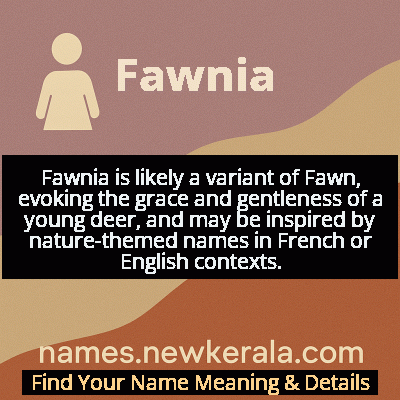Fawnia Name Meaning & Details
Origin, Popularity, Numerology Analysis & Name Meaning of Fawnia
Discover the origin, meaning, and cultural significance of the name FAWNIA. Delve into its historical roots and explore the lasting impact it has had on communities and traditions.
Name
Fawnia
Gender
Female
Origin
French
Lucky Number
9
Meaning of the Name - Fawnia
Fawnia is likely a variant of Fawn, evoking the grace and gentleness of a young deer, and may be inspired by nature-themed names in French or English contexts.
Fawnia - Complete Numerology Analysis
Your Numerology Number
Based on Pythagorean Numerology System
Ruling Planet
Mars
Positive Nature
Generous, passionate, energetic, and humanitarian.
Negative Traits
Impulsive, impatient, moody, and can be overly emotional.
Lucky Colours
Red, maroon, scarlet.
Lucky Days
Tuesday.
Lucky Stones
Red coral, garnet.
Harmony Numbers
1, 2, 3, 6.
Best Suited Professions
Military, sports, philanthropy, leadership roles.
What People Like About You
Courage, energy, leadership, generosity.
Famous People Named Fawnia
Fawnia Mondey
Fitness Instructor and Entrepreneur
Pioneered pole dancing as a mainstream fitness discipline
Fawnia Soo
Dance Instructor
International pole dance champion and influential instructor
Fawnia Tenney
Author and Educator
Published works on feminine spirituality and nature-based practices
Name Variations & International Equivalents
Click on blue names to explore their detailed meanings. Gray names with will be available soon.
Cultural & Historical Significance
Extended Personality Analysis
Individuals named Fawnia typically exhibit a blend of gentle sensitivity and quiet strength that mirrors the deer symbolism inherent in their name. They often possess remarkable emotional intelligence and intuition, able to read subtle social cues and create harmonious environments. Their natural grace extends beyond physical movement to include diplomatic skills and the ability to mediate conflicts with tact and understanding. Fawnias tend to be deeply connected to nature and often find solace and inspiration in natural settings, whether through gardening, hiking, or environmental advocacy. While they may appear reserved initially, they form deep, meaningful relationships and demonstrate fierce loyalty to those they care about. Their creative talents often manifest in artistic pursuits, particularly those involving natural materials or themes. The journey from the vulnerable fawn to the strong deer metaphorically represents their personal growth—starting life with gentle innocence but developing resilience and wisdom through life experiences. They often become the emotional anchors in their families and social circles, valued for their compassionate listening and thoughtful advice.
Modern Usage & Popularity
In contemporary naming practices, Fawnia occupies a unique position as a rare but recognizable nature name that appeals to modern parents seeking distinctive yet meaningful options. While it doesn't rank in the top 1000 names in most English-speaking countries, it has maintained a consistent, though limited, usage pattern since the 1970s. The 21st century has seen a slight increase in interest, particularly among parents drawn to nature names and those seeking alternatives to more common choices like Daisy or Lily. Fawnia's appeal lies in its balance of softness and strength, making it attractive to parents who want feminine names with natural resilience. Social media platforms and baby name websites have contributed to its visibility, with many naming blogs highlighting it as a 'hidden gem' among nature names. The name finds particular resonance in regions with strong environmental awareness and among families with connections to wildlife conservation or outdoor lifestyles. Its rarity ensures that children named Fawnia are unlikely to encounter many namesakes, providing individuality while maintaining accessibility and phonetic clarity.
Symbolic & Spiritual Meanings
Fawnia carries profound symbolic meanings that extend beyond its literal translation as 'young deer.' In symbolic traditions worldwide, the fawn represents innocence in its purest form—the beginning of life's journey filled with wonder and vulnerability. This symbolism connects to broader themes of spiritual awakening and the preservation of childlike wonder in adulthood. The deer family, across various cultures, symbolizes gentleness, compassion, and the ability to move through life's challenges with grace and awareness. In Celtic mythology, deer were considered messengers between worlds, giving Fawnia connections to intuition and spiritual guidance. The name also carries associations with the forest as a place of mystery and transformation, suggesting someone who navigates life's complexities with natural wisdom. In psychological symbolism, the fawn represents the inner child and the importance of maintaining innocence and curiosity throughout life's experiences. The seasonal symbolism of spring and renewal further enriches the name's meaning, representing new beginnings, growth, and the cyclical nature of personal development and transformation.

